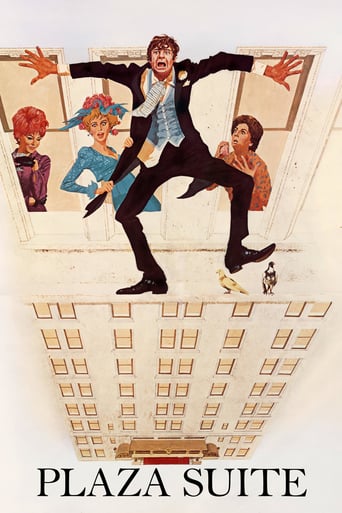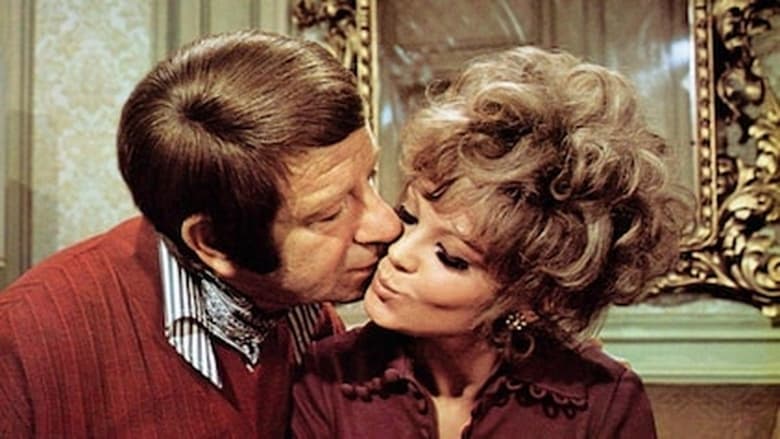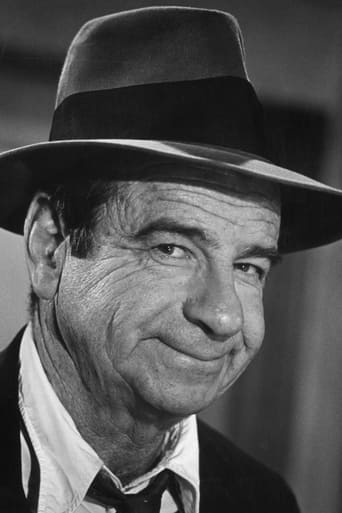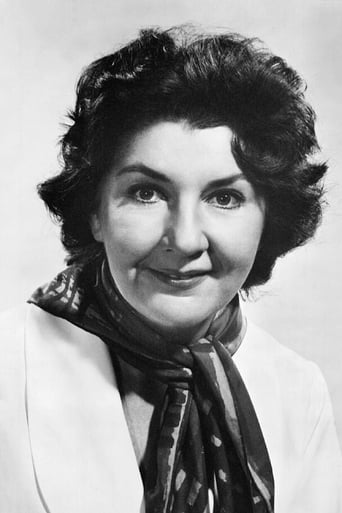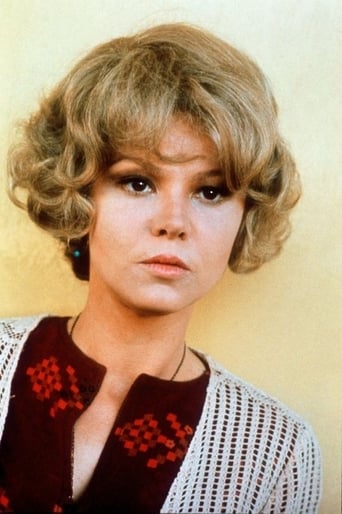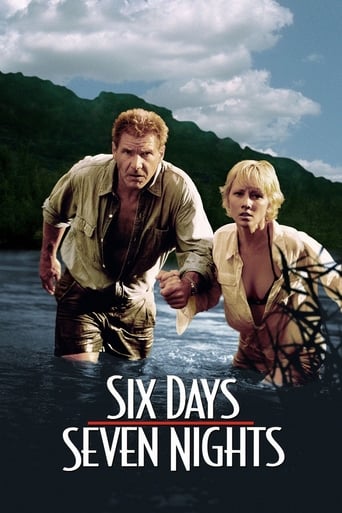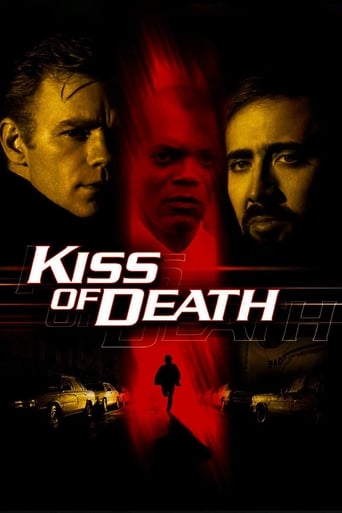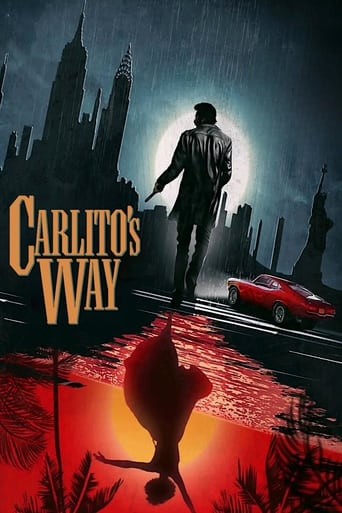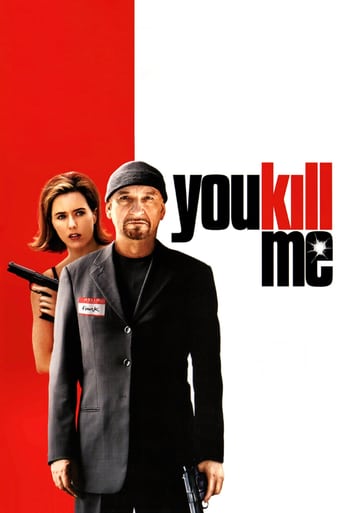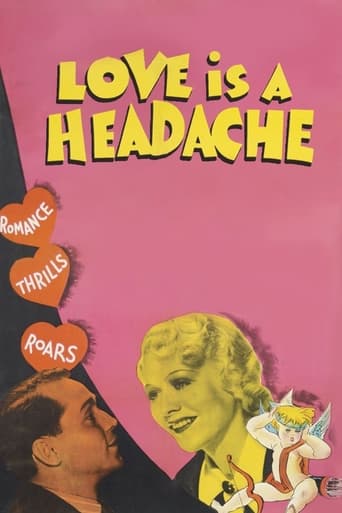Plaza Suite (1971)
Film version of the Neil Simon play has three separate acts set in the same hotel suite in New York's Plaza Hotel with Walter Matthau in a triple role. In the first, Karen Nash tries to get her inattentive husband Sam's attention to spruce up their failing marriage. In the second, brash film producer Jesse Kiplinger tries to get his former one-time flame Muriel to see him for what he stands for. In the third, Roy Hubley and his wife Norma try and try to get their uncertain-of-herself daughter out of the bathroom before her approaching wedding.
Watch Trailer
Cast
Similar titles
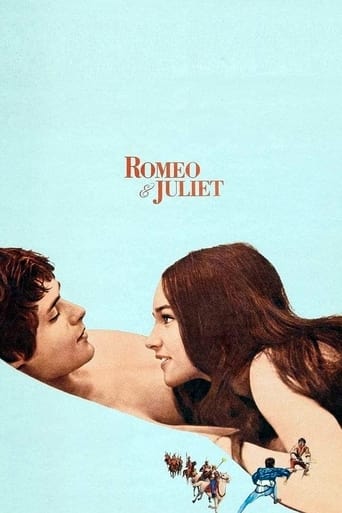
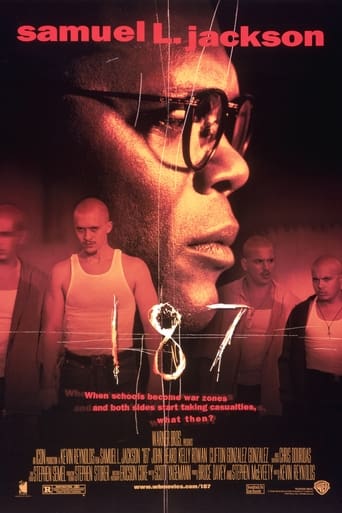
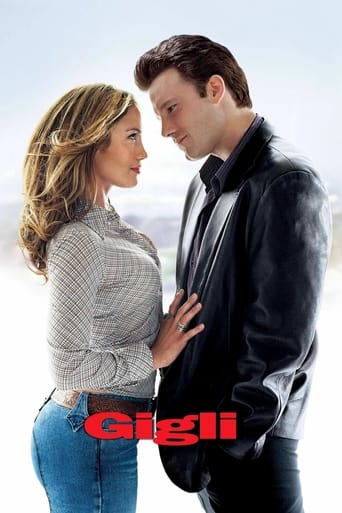
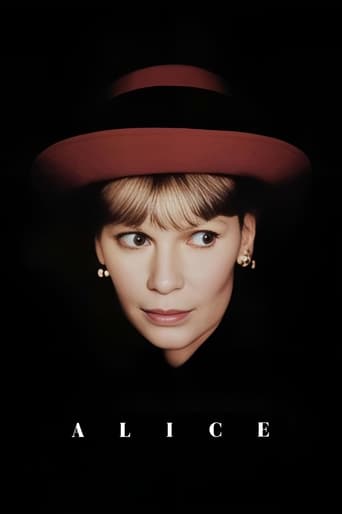
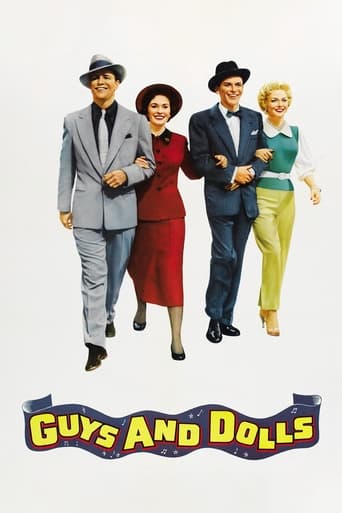
Reviews
Absolutely Brilliant!
It's a movie as timely as it is provocative and amazingly, for much of its running time, it is weirdly funny.
It is neither dumb nor smart enough to be fun, and spends way too much time with its boring human characters.
This is a dark and sometimes deeply uncomfortable drama
Central Park South is the setting of this film version of the Neil Simon hit Broadway play that gets a faithful film adaption that is both character driven and a comedy of the lack of American manners. A business man reveals to his wife on their 30th anniversary that he's been having an affair; A movie star meets an old girlfriend for chat and a hopeful rendezvous; A frustrated father of the bride deals with his nervous daughter. The women all face their situations with typical Neil Simon humor, a bit of bitterness. an overabundance of vodka stingers and brittle cynicism mixed with love and embarrassment. Walter Matthau plays all three men with different looks-one dark haired with a mustache, one a California dyed blonde and one salt and peppered with an expensive tux. The women were three of the most popular stage and screen actresses of the time and all superb if at least one a bit annoying in her clinging manner. That honor goes to Maureen Stapleton, too loving, a bit cloying and way too chatty. Dealing with the news that her 30 year marriage may be on the rocks (plus the presence of anchovies in her room service order that she particularly requested she not get. Louise Sorel is the secretary who pops by with paperwork which leads to the revelation of the six month fling he's been trying to end. This segment ends with a bittersweet conclusion and while Stapleton's character could be a bit too much, I felt sorry for her in many different ways.Broadway musical star Barbara Harris is the vodka stinger guzzling former girlfriend of movie lothario Matthau's, a station wagon wife and mother who is impressed by the name- dropping Matthau who is spoofing Hollywood pretty boys trying to remain glamorous past their prime. This is the least interesting of the three segments because the motivations are simply one dimensional and the characters aren't fully drawn out.This leaves the best for last, a wedding segment with Matthau sounding very much like Archie Bunker and Lee Grant as the frustrated wife and mother. Grant is excellent, giving the best of the female performances even though it was Stapleton who ended up with a Golden Globe nomination.It's easy to see why Matthau was so popular at this time and remained a leading man in spite of looking like a character performer. In spite of his gruffness, there is something really likable about him. He reminds me of the crazy uncle who amuses the kiddies while annoying the adults. Small moments work better here than some of the bigger moments. Some familiar faces add on to the character driven plays including familiar soap faces Jordan Charney and Augusta Dabney.
I should probably first note that I have a bias. I'm a huge Walter Matthau fan. Almost any film with Matthau in it can get up to a two-point boost from me simply because of his presence, which naturally implies a great performance. With Plaza Suite, I'm not sure there was any overhead to fill, although my initial reaction to the second segment of the film this time around was that it perhaps brought the score down to a 9. However, on further reflection, I think the performances in each section of this film are perfect, as is Neil Simon's writing and Arthur Hiller's direction.And if those three aspects are perfect, so is the film, as Plaza Suite is one of the purist examples of a structurally simple "filmed play" that can be had. As such, it shows why the normative advice that "films should not be filmed plays" is not hard and fast. It depends on the material. In some cases, such as Plaza Suite, nothing else would have worked better than this "filmed play".Except for a couple very minor shots, mainly to serve as segues between the three segments, the whole film takes place in a single hotel room--a suite at New York City's Plaza Hotel. Although there are a few ancillary characters, the film solely rests on the shoulders of three man/woman couples.The play by Neil Simon first ran at the Plymouth Theater in New York City beginning February 14, 1968, with Mike Nichols directing. The play was unusual in that George C. Scott and Maureen Stapleton took on the roles of three different couples.After Arthur Hiller's success with the Neil Simon work The Out-of-Towners (1970)--which was initially written as a segment of Plaza Suite, by the way, but then siphoned off because Simon rightly felt it was too different tonally--Hiller was contracted to do the film version of Plaza Suite as well. George C. Scott had just become a big star because of 1970's Patton, and was unavailable. Thankfully, Hiller tapped Matthau to play the male roles. As with the stage version, Matthau plays three different parts. Slight changes in make-up and costume aid his varied performances. Because Hiller felt that also having the same woman play three different parts would probably confuse film audiences (and at present, audiences would probably try to figure out what the Matrix (1999)-like plot is if the same actors played all three couples), he instead had Stapleton reprise her role in the first segment, while Barbara Harris did the second and Lee Grant the third.The first segment, "Visitors from Mamaroneck", concerns Sam (Matthau) and Karen Nash (Stapleton). Karen has booked Suite 719 at the Plaza to celebrate their wedding anniversary. Sam arrives a bit late. It quickly becomes clear that all is not marital bliss with the two. Sam is mostly preoccupied with work, and they bicker about everything, including how old Karen is, whether they really stayed in 719 on their honeymoon all those years ago, and just how long they've been married.The second segment, "Visitors from Hollywood", concerns film producer Jesse Kiplinger (Matthau) and Muriel Tate (Harris). Kiplinger is staying in Suite 719, at some other point in time. He's in town on business. He calls up Tate, an old flame, now married with three kids, in his hometown in New Jersey. Tate hesitates but shows up at his hotel for "one quick drink". Kiplinger just wants to use her, and the segment is a subtly complicated cat and mouse game between the two.The third segment, "Visitors from Forest Hills", concerns Roy (Matthau) and Norma Hubley (Grant), parents of a bride-to-be. They're in Suite 719, at some other point in time, all decked out for their daughter's wedding, which is being held downstairs in the very expensive hall. However, their daughter has locked herself in Suite 719's bathroom and won't come out or respond. The segment has Roy and Norma trying everything they can think of to get their daughter to come around, while they bicker all the way.The performances in each segment are quite different in approach. In the first, Matthau and Stapleton begin in almost a quiet realist drama mode, gradually work up to very intense comedy, and gradually transform that into even more intense, serious turmoil. The progression provides a breathtaking ride, with Stapleton particularly impressive (Matthau is appropriately much more subdued). This segment has a surprisingly downbeat conclusion.In the third segment (I'll come back to the second), Matthau and Grant stay in a fairly high-intensity comedy mode throughout. This is the funniest segment (intentionally so)--I routinely had to pause the DVD because I was laughing so hard, and I've seen this film a number of times over the years. The comedy is an unusual combination of witty dialogue occasionally veering almost towards slapstick. It ends the film on a very high note.The second segment was the one I had a problem with initially, as at first the performances do not seem nearly as confident and convincing. However, on analysis, they're not supposed to seem confident or convincing. Matthau and Harris' characters are each playing very unsure roles with each other. Kiplinger is experimenting with his manipulations and Tate is experiencing a rapid onrush of conflicting thoughts and desires. The "shaky" performances are perfect for the roles.Although Plaza Suite is at heart a play, Hiller lets his filmic sense strongly affect the work, but in very subtle ways. For example, in the first segment, there is a clever usage of staging to symbolically show the rapidly evolving relationship. There is also ingenious usage of camera movement around Stapleton at appropriate moments. The other segments use similar techniques.The confluence of superb writing, superb direction and the veritable master class for actors results in a must-see film that's both moving and hilarious.
I couldn't relate to that other review at all. We're talking about a seriously entertaining film here, I'm not sure exactly what was boring about it. The hilarity was pretty much non-stop, all the roles were delightfully impeccable, and I doubt that the writing could be flawed at all. I can see how the recommendation below points towards "The Royal Tenenbaums" too, obviously the comedy here-in takes a certain understanding to fully sink in. Not to mention the brilliant poignancy it leaves behind."Boring"... feh. That's someone who needs a good hard drink.
I expected this 1971 film to be a bright comedy. Instead I was presented with the filming of a very deep three-part stage play about the dark side of human relationships; only the last of the three stories could really be called funny.A bride-to-be locks herself in the bathroom and her parents go through all kinds of hilarious slapstick agony trying to persuade her to come out. It is free of the darker undertones of the first two vignettes and has a cute surprise ending with a happy message. The other two, while being wry and witty in places, are really commentaries on the nature of man's unfaithfulness and exploitation of women, and women's culpability in allowing that state of affairs to develop and continue.Walter Matthau plays the lead in each of the three stories, which take place in the same suite, 719, of the Plaza Hotel in Manhattan. He has different leading ladies in each one: Maureen Stapleton, Barbara Harris and Lee Grant. There are a few incidental characters but the stories revolve around the two main characters in each story. The dialogue is quite true to real life, even appearing to be repetitive and meaningless in places as real life conversations can be, but the playwright is taking us in each case to a specific understanding of the characters. There is nothing extraneous even though at first it appears to be cluttered with incidentals.In the first story, a husband and wife check into the Plaza Hotel for their anniversary - and then things begin to fall apart. Maureen Stapleton as the seemingly scatterbrained wife is brilliant in playing both the tragic and comic aspects of this complicated role. As the story unfolds we realize things are not as they appear on the surface.In the second story, a sleazy Hollywood businessman calls up various names in his little black book so that he can have some woman - any woman - come to his suite for sex from 2 to 4 between meetings. The woman from his past whom he persuades to show up is both afraid of the possible seduction and hoping he will talk her into it. This is all too painful and familiar a scenario and anyone will relate to the awkward dance between two individuals who have to try to save face while getting their needs met.If you are looking for a light and fluffy comedy this is not the one to choose. It will disturb you and make you think about the tragic aspects of love, sex and marriage, long after it is over.
